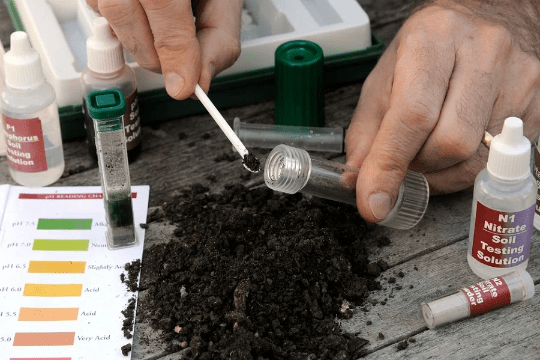
In gardening, accurate pH measurement of soil samples has become increasingly important. Understanding soil pH goes beyond determining its acidity or alkalinity; it directly impacts nutrient availability, soil life, and plant suitability. Commercial and recreational gardeners seek efficient and reliable soil pH testing methods. Demeter Enviro's pH Probing test kit provides a rapid and accurate solution, empowering gardeners to make informed decisions about plant selection and soil treatment. In this comprehensive blog post, we will explore the significance of soil pH and the factors affected by it and delve into the step-by-step process of testing soil pH using Demeter Enviro's pH Probing test kit.
Understanding the Importance of Soil pH
Soil pH is critical in determining the availability of essential nutrients for plants. The pH level affects nutrient release and solubility, directly impacting plant growth and overall health. Different plants have varying pH preferences, and maintaining the optimal pH range for specific plants is essential for maximizing their productivity and vitality.
Additionally, soil pH influences the activity of soil microorganisms, such as bacteria and fungi, which play a crucial role in organic material decomposition and nutrient cycling. These microorganisms have specific pH ranges in which they thrive, and maintaining the appropriate soil pH ensures a favorable environment for their growth and activity.
Testing the pH of Soil Samples with Soli Test Kit
Testing the pH of soil samples is crucial in understanding the Soil's characteristics and making informed decisions regarding plant selection and soil management. Demeter Enviro's pH soil contamination test kit offers a rapid and user-friendly solution for testing soil pH. Here's a step-by-step guide to testing the pH of your Soil using the equipment:
1. Soil Sampling: Start by collecting representative soil samples from the areas of interest. Ensure that the models are free from debris, rocks, or any other contaminants that may affect the accuracy of the test.
2. Preparation: No sample preparation or preservative is required if you use Demeter Enviro's pH Probing test kit. Ensure that the soil samples are dry and in a suitable condition for testing.
3. Soil Contamination Test Kit: Demeter Enviro's pH soil contamination test kit includes all the necessary components for accurate pH measurement. It typically consists of a pH meter, pH electrodes, calibration buffers, and detailed instructions for use.
4. Calibration: Before proceeding with the pH measurement, it is essential to calibrate the pH meter using the provided calibration buffers. Calibration ensures accurate and reliable readings. Follow the instructions supplied with the test kit to calibrate the pH meter correctly.
5. pH Measurement: Once the pH meter is calibrated, it is time to measure the pH of your soil samples. Insert the pH electrode into the soil sample, ensuring it is adequately immersed. Allow the pH meter to stabilize, and record the pH reading displayed on the meter.
6. Multiple Samples: To ensure accuracy, testing various soil samples from different areas within your garden or site is recommended. This will provide a more comprehensive understanding of the pH variations in your Soil.
Understanding the Results and Taking Action
Interpreting the pH test results is crucial for taking appropriate actions to optimize soil conditions for plant growth. Here are some guidelines to understand the significance of the pH readings and potential activities to take:
7. pH Range: The pH of Soil is typically measured on a scale of 1 to 14, with values below 7 indicating acidity and above 7 indicating alkalinity. Ideally, most plants thrive within a pH range of 6 to 7, which is slightly acidic to neutral. However, it is essential to consider the specific pH preferences of the plants you intend to grow, as different plants have varying requirements.
8. Acidic Soil (pH < 6): If your soil pH falls below the desired range, it indicates acidic Soil. Acidic Soil can lead to nutrient deficiencies and hinder plant growth. Consider adding agricultural or dolomite lime to raise the pH and make the soil more alkaline. These materials can neutralize acidity over time and improve nutrient availability for plants.
9. Alkaline Soil (pH > 7): If your soil pH exceeds the desired range, it indicates alkaline Soil. Alkaline Soil can lead to nutrient imbalances, making sure nutrients are less available to plants. To lower the pH and make the Soil more acidic, consider adding organic matter like compost or using acidifying agents such as elemental sulfur. These amendments help in acidifying the Soil and improving nutrient availability for plants.
10. Balanced Soil (pH within a desired range): If your soil pH falls within the selected range for your target plants, congratulations! Your balanced soil pH promotes optimal nutrient availability and supports healthy plant growth. However, regular monitoring is still recommended as pH can change over time due to various factors, including the plants grown, rainfall, and soil amendments applied.
Conclusion
Accurate soil pH testing is crucial for successful gardening and proper soil management. Demeter Enviro's pH soil test kit provides a rapid and reliable solution for measuring soil pH, enabling gardeners to make informed decisions regarding plant selection and soil amendments. By understanding the significance of soil pH, interpreting test results, and taking appropriate actions to adjust soil pH, gardeners can create an optimal environment for plant growth and maximize their gardening success. Invest in Demeter Enviro's pH soil contamination test kit and unlock the power to optimize your Soil's pH for healthier plants and bountiful harvests.